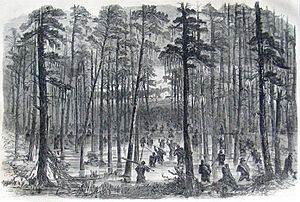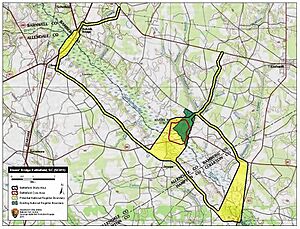Battle of Rivers' Bridge facts for kids
Quick facts for kids Battle of Rivers' BridgeAction at Rivers' Bridge |
|||||||
|---|---|---|---|---|---|---|---|
| Part of the Campaign of the Carolinas | |||||||
 Charge of Weaver's Brigade Across the Salkehatchie |
|||||||
|
|||||||
| Belligerents | |||||||
| Commanders and leaders | |||||||
| Francis Preston Blair, Jr. John A. Logan |
Lafayette McLaws | ||||||
| Units involved | |||||||
| XVII Corps XV Corps |
Department of South Carolina, Georgia, and Florida | ||||||
| Strength | |||||||
| 5,000 | 1,200 | ||||||
| Casualties and losses | |||||||
| 124 (18 killed, 106 wounded) |
97 (8 killed, 44 wounded, 45 captured/missing) |
||||||
The Battle of Rivers' Bridge (also known as the Action at Rivers' Bridge) was a battle of the American Civil War. It took place on February 3, 1865, in Bamberg County, South Carolina. This battle was part of the Campaign of the Carolinas, where Union forces marched through the South. The Union army won this battle.
Contents
Who Fought at Rivers' Bridge?
This battle involved soldiers from both the Union and Confederate armies. They were led by important generals.
The Confederate Forces
The Confederate soldiers were led by Major General Lafayette McLaws. His troops included different groups from Georgia, North Carolina, and South Carolina. They were ready to defend their positions.
The Union Forces
The Union army was much larger. It was led by Major General Francis P. Blair, Jr.. His forces included two main groups, the XVII Corps and the XV Corps. These groups had many different regiments from states like Illinois, Missouri, Ohio, New Jersey, Wisconsin, and Indiana.
The Battle Unfolds
The battle happened as Union General William T. Sherman's army marched north through South Carolina. About 1,200 Confederate soldiers, led by Major General Lafayette McLaws, were waiting at a crossing on the Salkehatchie River.
Union Strategy
On February 2, Union soldiers started building bridges. They wanted to find a way around McLaws's defenses. The next day, two groups of Union soldiers, led by Major General Francis P. Blair, bravely waded through the swamp. They managed to get around the Confederate soldiers from the side.
Confederate Retreat
The Confederate forces tried to hold their ground. However, with the Union soldiers flanking them, McLaws decided to pull his troops back. They moved towards a town called Branchville. The Confederates only managed to slow Sherman's army down for one day. After the battle, Sherman's forces continued their march north towards Columbia, the state capital.
Remembering Rivers' Bridge
Years after the battle, in 1876, people from nearby towns gathered. They reburied the Confederate soldiers who died at Rivers' Bridge in a large grave. This started a tradition of remembering the battle each year.
A Historic Site
Later, a group called the Rivers Bridge Memorial Association took care of the battlefield. In 1945, they gave the land to South Carolina. Today, it is known as the Rivers Bridge State Historic Site. It helps us remember this important part of history.
What You Can See Today
At the historic site, you can still see the earthworks. These are the defensive walls that the Confederate soldiers built. A part of the bluff overlooking the river was changed a lot later on. This happened when a logging railroad was built nearby in the late 1800s.
 | Aurelia Browder |
 | Nannie Helen Burroughs |
 | Michelle Alexander |


